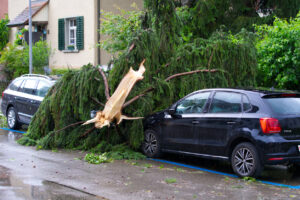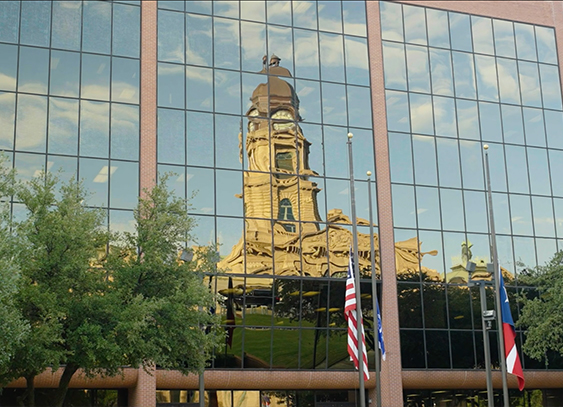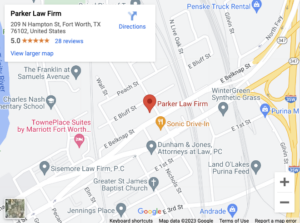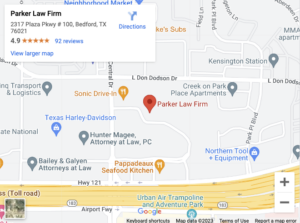
If someone damages your property through some sort of misconduct, you can probably file a property damage claim against them. In some cases, you can file a property damage claim against someone without even proving they were at fault.
Property damage claims often arise out of accidents that also generate personal injury claims. Courts and negotiating parties typically resolve personal injury claims and property damage claims together.
Typical Property Damage Incident to Personal Injury Claims
Following is a list of some of the most common property damage claims arising out of injury accidents:
- Vehicle Damage – The most common property damage in personal injury cases, such as in car accidents.
- Agricultural Equipment – Damage to farm equipment in accidents.
- Artwork – Pieces of art that are destroyed or harmed during an incident.
- Bicycles – Damage to a bicycle in a collision with a car or another cyclist.
- Boats – Damage to watercraft in boating accidents.
- Children’s Property – Toys or other items belonging to children that are damaged.
- Clothing – Torn or ruined clothing as a result of an accident.
- Computers and Tablets – Laptops or tablets broken in the course of an accident.
- Fences – Damage to a property’s fencing from a vehicle or other accident.
- Food and Perishables – In the case of an accident that compromises a home or vehicle, stored food may be spoiled or contaminated.
- Furnishings – Items inside a home, such as furniture or decorations, that are damaged.
- Gates and Doors – Damage to exterior gates or doors of a person’s property.
- Home Damage – Structural damage to a home from an incident like a gas explosion.
- Landscaping – Damage to a person’s yard or garden, including trees and shrubbery.
- Medical Devices – Damage to prosthetics, wheelchairs, or other assistive devices.
- Mobile Phones – Smartphones damaged during an incident.
- Motorcycles – Damage to motorcycles in road accidents.
- Musical Instruments – Instruments that are broken or damaged.
- Pets – Though not ‘property’ in the traditional sense, harm to pets can lead to claims.
- Photographic Equipment – Cameras and related gear that can be damaged.
- Recreational Vehicles (RVs) – Damage to RVs in accidents or incidents.
- School Property – Damage to school supplies or uniforms.
- Sports Equipment – Damage to items like golf clubs, skis, or other sports-related property.
- Toolkits and Machinery – Damage to personal or work-related tools and machinery.
- Personal Accessories – Watches, jewelry, and eyewear that could be damaged.
Make sure you have proof that you own any damaged or destroyed property for which you plan to claim compensation.
Beware the Statute of Limitations
Texas generally allows you only two years to file a lawsuit for property damage. This two-year countdown can be suspended under certain circumstances, such as, for example, the defendant has left Texas and is therefore not subject to service of process.
Negligence: The Most Common Form of Property Damage Liability
Yes, someone might total your car in a “road rage” incident. Most likely, however, they will damage your property through negligence (carelessness). To win a negligence claim against someone who damaged or destroyed your property, you must prove:
- The defendant word you a duty of care. Just about every competent adult owes every other person a duty of reasonable care to avoid damaging their property.
- The defendant breached their duty of care to you: They either did something they shouldn’t have done or didn’t do something they should have done.
- You suffered property damage. To claim your property’s full value, you must be able to prove what it’s worth.
- The defendant’s breach of their duty of care to you is what caused your property damage.
- A reasonable person could foresee that if the defendant breached their duty of care in the manner that they did, the property damage you suffered was a likely consequence.
You must prove the foregoing facts on a “more likely than not” basis.
Vehicle Damage in a Car Accident: The Most Common Type of Property Damage Claim
Texas, like other states, handles car accident vehicle damage claims by requiring its drivers to purchase insurance. Like most states, Texas is an “at-fault” state. That means a driver with a damaged vehicle can proceed immediately to either (i) file a lawsuit against the at-fault driver or (ii) file a third-party claim against the at-fault driver’s auto accident liability insurance.
Texas requires its drivers to purchase auto accident liability insurance in the following minimum amounts:
- $30,000 per person bodily injury liability insurance;
- $60,000 per accident bodily injury liability insurance; and
- $25,000 in property damage liability insurance.
These insurance policies will pay for personal injury and property damage cumulatively, meaning, for example, $30,000 in bodily injury liability plus $25,000 in property damage liability. One amount is not set off against the other, the way “per victim” vs. “per accident” limits are set off against each other.
Optional Property Damage Insurance
You don’t have to settle for purchasing the Texas mandatory minimum auto insurance. For extra protection, you can purchase the following types of insurance:
- Collision insurance, which covers damage to your car regardless of fault.
- Comprehensive coverage, which covers damage to your car from just about any source except an accident (vandalism, for example).
- Uninsured/underinsured motorist insurance, which protects you against uninsured drivers, large losses, and hit-and-run drivers.
You can also purchase property damage liability insurance in amounts greater than the mandatory minimum.
Homeowners’ Insurance
Homeowners’ insurance (and renters’ insurance if you rent) does a fairly good job of protecting you against property damage that occurs inside your home or in your yard. Read your policy carefully.
Contact a Fort Worth Lawyer To Help You Handle a Significant Property Damage Claim
You might not need a lawyer to help you handle a minor fender-bender. On the other hand, you might need a lawyer to help you handle a claim arising from the destruction of an expensive automobile.
You might also have a valuable personal injury claim. Speak to an experienced Fort Worth personal injury lawyer at Parker Law Firm Injury Lawyers as soon as you can after an accident that causes property damage. Contact us today at (817) 839-3143


